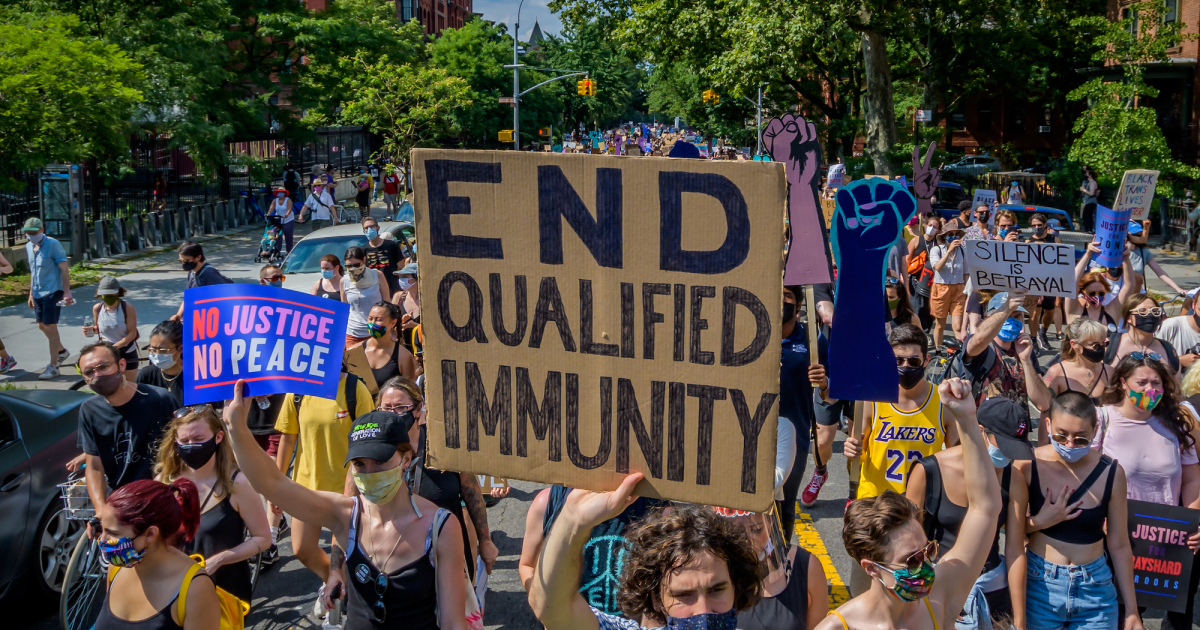
Governor Michelle Lujan Grisham signed House Bill 4, abolishing the qualified immunity defense in state civil court.
Qualified immunity is the legal principle granting state actors immunity from civil suits such as being sued, unless the plaintiff can prove the state actor violated ‘clearly established statutory or constitutional rights of which a reasonable person would have known.’
In other words, qualified immunity protects public servants from civil rights lawsuits unless their behavior was clearly established in law or another high profile case. Qualified immunity was intended to be used as a shield to protect public servants from retaliatory or frivolous lawsuits. However, the application of qualified immunity has drawn heavy scrutiny from critics of the police brutality and lack of accountability that has been in the news over the past year.
Defenders of qualified immunity claim it would impede on proper and confident police work, causing officers to not act in time of need out of fear of being sued. Those who are against qualified immunity have refuted claims of individuals being sued due to the passing of the New Mexico Civil Rights Act which passed last year, requiring government agencies, not the individuals, to pay for damages and legal costs.
Critics of the bill claim taxpayers will now bear the cost of police misconduct. Defenders of the bill allege cops aren’t being held accountable for acting improperly while on duty and point to the New Mexico Civil Rights Commission who released a statement claiming, “the cost of protecting the rights of New Mexicans involves values fundamentally different from other budget questions the legislature faces.”
House Bill 4 was passed in response to criticisms of police misconduct, brutality and lack of accountability in examples such as Plaintiff Kenneth Johnson, a black man from Hobbs who alleges a corrupt effort by the Lea County Drug Task Force tried to send him to prison “through a malicious prosecution” and that Hobbs police officers further harassed him months after being found not guilty by subjecting him to “an unlawful seizure and search”.
The abolition of qualified immunity isn’t necessarily aimed to combat police brutality in cases such as the 2019 instance in Belen, New Mexico, where body cam footage showed officer Scott Gordon slamming a handcuffed suspect to the ground, causing his head to split open and need medical attention. Qualified immunity likely couldn’t be used as a defense if charges were pressed against Officer Gordon as there are clearly established laws and precedent of how to properly treat suspects in custody. Reasonably, officer Gordon would understand his actions were unacceptable.
The abolition addresses more specific cases of police accountability, in such cases as James McGarry, a Lincoln County resident who was wrestled to the ground with excessive force despite posing no immediate threat. The officers were granted qualified immunity because McGarry’s rights were not clearly established.
“During August 2009, two citizens filed written complaints with the New Mexico State Police that Wester, the same cop involved in Kenneth Johnson’s case, had threatened to falsely arrest and shoot an unarmed citizen who had not committed any crime but who had gotten into a verbal dispute with Defendant in a parking lot. Not long afterwards, Defendant Wester left the State Police and was hired by the Defendant Lea County Sheriff’s Department as a deputy sheriff.” Under qualified immunity, one could hypothetically argue that due to the lack of prior laws or high profile cases involving verbal altercations in a parking lot, Defendant Wester wouldn’t have reasonable knowledge of how to conduct himself and could not be accountable for their actions.
Qualified immunity was granted to two cops in Fresno, California who were accused of stealing $225,000 dollars while executing a search warrant. The cops were granted qualified immunity, claiming they ‘did not have clear notice that it violated the Fourth Amendment.’
In 2014, a similar case happened in Coffee County, Georgia, where a cop shot a 10-year old who was lying on the ground after complying with the officer’s orders. The officer attempted to shoot the dog, but missed, hitting the 10-year old boy in the back of the knee. The officer was given qualified immunity due to a failure to present any materially similar case from the U.S Supreme Court or the Supreme Court of Georgia that would have given the cop fair warning that his particular conduct violated the Fourth Amendment.
The abolition aims to hold law enforcement officers accountable for actions that may blur the lines of legality, protect citizens from state actors and eliminate officer’s exoneration due to vague and nebulous guidelines of what precedent was previously set.
Gov. Lujan Grisham spoke in a news release regarding the decision. “This bill does not endanger any first responder or public servant—so long as they conduct themselves professionally within the bounds of our constitution and with a deep and active respect for the sacred rights it guarantees all of us as New Mexicans.”


